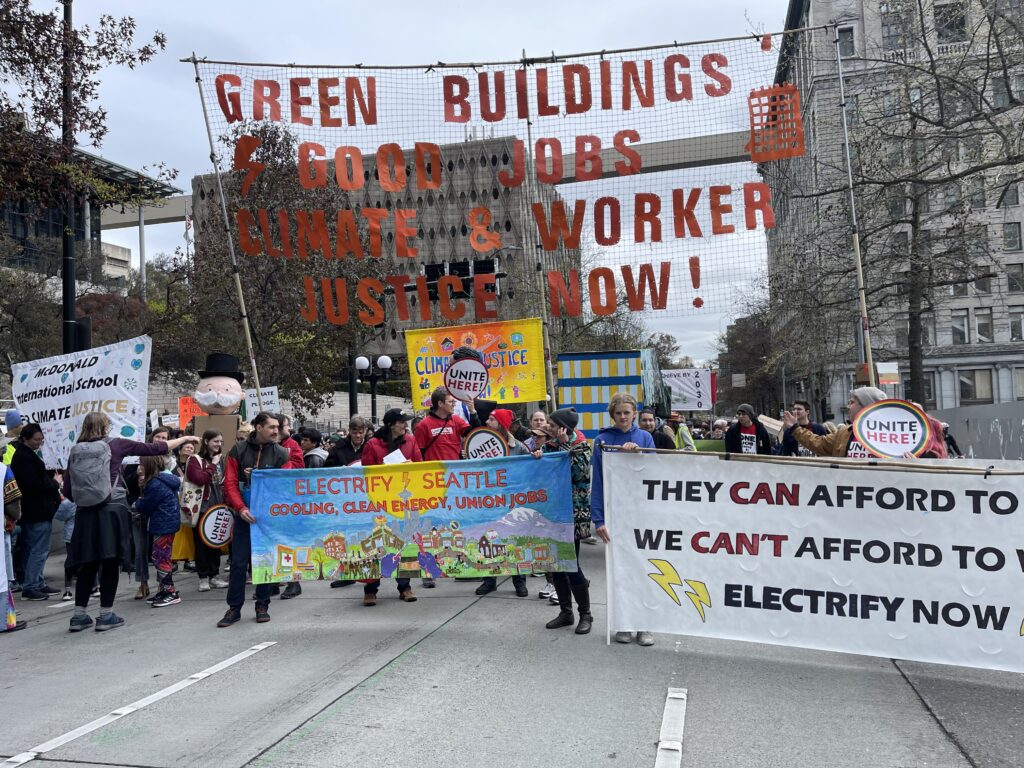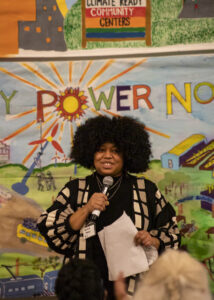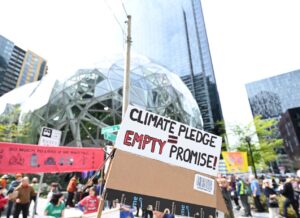Seattle WA – In the week following the Biden administration’s approval of yet another massive fossil fuel project, hundreds took to the streets to demand major climate action from Seattle City Leaders and marching on Amazon for opposing climate action.
Seattle has a huge opportunity to kickstart a rapid local transition off fossil fuels, by passing a policy that requires large buildings (>20k sq ft) to upgrade for clean energy. Earth Day protesters called on City Leaders to stop delaying the policy and to accelerate the timelines for transitioning off fossil fuels from 2045 to 2030.
“Upgrading Seattle’s big buildings for clean energy is our chance to create thousands of good, green union jobs. We can bring life-saving cooling to homes and workplaces across Seattle. We can tackle our city’s fastest-growing source of climate pollution. And we can do it this decade – the technology and skilled workers are already here.” said 350 Seattle Executive Director Shemona Moreno. “But the City’s current plan is to transition by 2045 – abandoning Seattle renters to sweat through another 20 years of heat waves, leaving millions of dollars of IRA funding on the table, and completely failing to meet our city’s Green New Deal goals.
After rallying at City Hall, Earth Day protesters marched on downtown Seattle’s biggest climate polluters, with a stop and rally at the Fairmont Hotel. Labor leaders called for city policies that will green local industries and incentivize hotels to reduce their carbon impact while investing in healthy communities.
“The tourism industry is a major source of global carbon emissions and hotels themselves have higher greenhouse gas emissions than office, apartment, or school buildings,” said UNITEHERE Local 8 President Anita Seth. “We see opportunity for Seattle’s hotel industry to lead on reducing climate impacts and provide a foundation for a new future of sustainable tourism, consistent with the City’s vision of a healthy, sustainable, and green city that is a top local and travel destination.”
Ending at the Amazon Spheres, the Earth Day action highlighted the role of big corporations like Amazon that are actively lobbying to delay local climate action. According to City of Seattle data, Amazon’s data centers are in the top 1% of the most climate-polluting buildings in Seattle.The company sits on the board of two of the three major industry associations which are actively opposing the plan to move Seattle’s big buildings off fossil fuels. Local climate groups are demanding that Amazon publicly support Seattle’s Green New Deal legislation that moves big buildings off fossil fuels by 2030, saying that if Amazon was serious about its Climate Pledge, the company wouldn’t be opposing climate policy in its hometown.
The Earth Day Action, organized by a coalition of organizations including UNITE HERE Local 8, 350 Seattle and Sierra Club, kicks off a summer of climate-labor coalition organizing to win local Green New Deal policies that reduce Seattle’s climate pollution, build climate resilience and create good green union jobs.
Earth Day Action organizers and spokespeople are available for follow up.
Additional Resources
- Additional photos available here
- Electrify Seattle campaign demands and website
- Earth Day Rally + March Flyer
- MLK Labor Council Resolution in support of Seattle’s Building Emissions Performance Standard policy
- Big corporations and real estate giants actively oppose the plan to move Seattle’s big buildings off fossil fuels
About the Building Emissions Performance Standards (BEPS) Policy
Seattle’s action via the BEPS policy would be one of the first in the country to require existing buildings to transition off fossil fuels to clean energy and aligns with nationwide momentum to address climate pollution from buildings. Washington’s state energy and building codes (updated in 2022), already require new homes and buildings to be built with heat pumps, but the vast majority of building emissions come from existing buildings that use fossil gas for space and water heating. Fossil fuels used for space and water are responsible for 98% of emissions from existing commercial buildings in Seattle.
Beyond just carbon emissions, using gas in buildings produces outdoor and indoor air quality pollution and has increasingly been viewed as a health hazard. Burning methane gas in buildings emits dangerous air pollutants like nitrogen oxide (NOx) and particulate matter (PM2.5) leading to dozens of early deaths and hundreds of millions of dollars’ worth of annual health impacts in Washington, disproportionately impacting people of color. Electric appliances, like heat pumps, can also increase climate resiliency as heat waves intensify in Washington, by providing cooling. As of 2022, only 53% of Washingtonians have air conditioning, meaning many will benefit from installing an electric heat pump.
Seattle’s Office of Sustainability and Environment estimates that the BEPS policy will create 150-270 new, well-paying jobs annually.
We don’t anticipate the recent 9th Circuit ruling on the Berkeley ordinance to impact Seattle’s upcoming efforts to pass a Building Emissions Performance Standard. Seattle’s BEPS policy is a performance-based standard designed to encourage a transition to clean electricity and reduce pollution in existing buildings, not an explicit ban on gas hookups.









